Are you concerned about the impact of plastic waste on the environment? As a stainless steel water bottle manufacturer, you have the power to make a difference. By adopting circular economy principles, you can contribute to a sustainable future while also creating value for your business.
Plastic waste is one of the biggest environmental challenges we face today. Every day, millions of single-use plastic bottles end up in landfills or oceans, where they take hundreds of years to decompose and release harmful chemicals into the environment.
As consumers become more aware of these issues, demand for sustainable alternatives like reusable water bottles is growing rapidly. This presents an opportunity for stainless steel water bottle manufacturers to lead the way in creating a circular economy by designing products that are environmentally friendly and easy to recycle or repurpose.
In this article, we will explore how stainless steel water bottle manufacturers can adopt circular economy principles and contribute to a more sustainable future.
Overview of the Environmental Impact of Plastic Waste
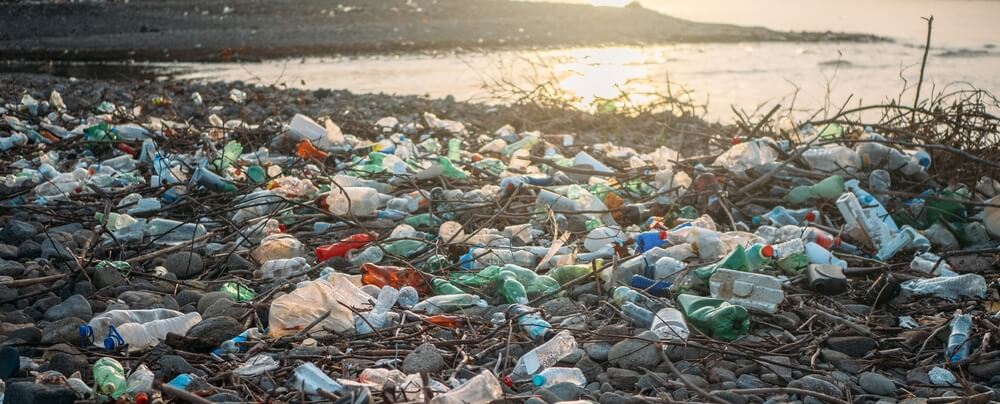
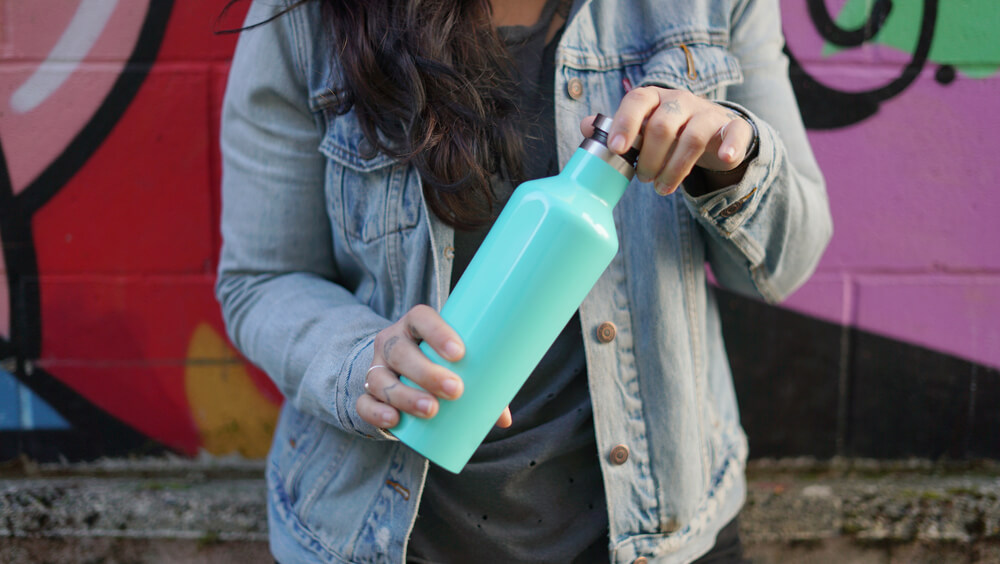
Plastic waste is wreaking havoc on our planet, and it's time for us to take action. Every year, over 8 million metric tons of plastic end up in the ocean, harming marine life and disrupting ecosystems. Plastic pollution also has a significant impact on human health, as microplastics are being found in our water sources and food.
The good news is that there are solutions for plastic pollution. One approach is to reduce single-use plastics, such as straws and grocery bags, which account for a large portion of plastic waste. Another solution is to improve recycling efforts by implementing better infrastructure and education programs. Additionally, companies can adopt circular economy principles by designing products with recyclable materials and promoting closed-loop systems.
The impact of plastic pollution on marine life cannot be overstated. From entanglement in fishing nets to ingestion of microplastics, animals are suffering greatly from our reliance on single-use plastics.
By taking action now to reduce plastic waste and promote sustainable practices, we can protect our oceans and ensure a healthier future for all living beings.
The Role of Stainless Steel Water Bottle Manufacturers
By embracing sustainable practices and designing products with longevity in mind, stainless steel water bottle manufacturers can play a crucial role in creating a closed-loop system for reusable containers.
Eco-friendly production processes are essential to reduce the environmental impact of manufacturing these bottles. These companies must source their materials sustainably to minimize the use of non-renewable resources and limit waste generation.
Stainless steel is an excellent material choice for water bottles due to its durability and recyclability. Manufacturers can ensure that their products have longevity by using high-quality materials and providing proper care instructions to consumers. By doing so, they reduce the need for frequent replacements, which would otherwise contribute to more waste generation.
In addition, stainless steel water bottle manufacturers should also consider implementing take-back programs or collaborating with recycling facilities to ensure that their products are properly recycled at the end of their lifespan.
This will help create a closed-loop system where new bottles can be made from recycled materials instead of relying on virgin resources. By adopting sustainable practices and promoting circularity, these companies can lead the way towards a more eco-friendly future.
Importance of Material Selection
When choosing your reusable container, it's important to consider the impact of the material you select on the environment and its longevity.
Stainless steel is a highly sustainable material choice for water bottles because it can be recycled endlessly without losing quality. In fact, stainless steel has one of the highest recycling rates of any material.
Not only is stainless steel environmentally friendly, but it also provides durability advantages. Unlike plastic water bottles that can crack or break easily, stainless steel water bottles are incredibly durable and long-lasting. This means that they can be used for years without needing to be replaced, reducing waste and ultimately saving money in the long run.
By choosing a stainless steel water bottle as your reusable container, you're making a sustainable choice that benefits both the environment and yourself. With its recyclability and durability advantages, stainless steel is a clear winner when it comes to selecting materials for eco-friendly products like water bottles.
Design for Disassembly
Consider how easy it is for you to disassemble and recycle your reusable container once its lifespan has ended. As a stainless steel water bottle manufacturer, designing for disassembly can be a key factor in contributing to the circular economy.
Modular design and disassembly techniques are crucial in this process. Modular design involves breaking down the product into separate modules that can be easily assembled and disassembled. This allows for more efficient repair, replacement, and recycling of individual components without having to discard the entire product.
Disassembly techniques such as snap-fit connections or threaded parts make it easier to take apart a product without causing damage. Designing for disassembly not only contributes to the circular economy by reducing waste but also creates economic benefits.
It allows for cost-effective repairs and replacements of parts while also creating new job opportunities in the recycling industry. By incorporating modular design and disassembly techniques, stainless steel water bottle manufacturers can contribute positively towards building a sustainable future.
Extended Producer Responsibility
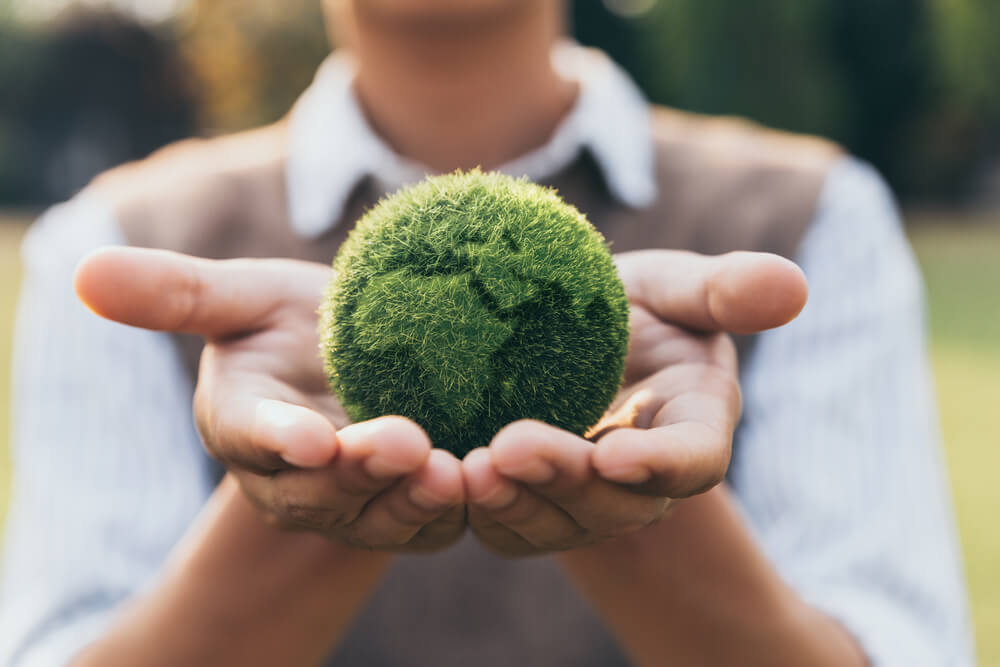
As a consumer, you've got the power to hold companies accountable for their environmental impact through extended producer responsibility (EPR) programs. These programs require manufacturers to take responsibility for the entire lifecycle of their products, including end-of-life disposal.
EPR is a form of product stewardship that contributes to a circular economy. One key aspect of EPR is waste management. Manufacturers can reduce waste and prevent pollution by ensuring that stainless steel water bottles are properly disposed of at the end of their useful life. This can be achieved by implementing take-back programs or partnering with recycling facilities to ensure that old bottles are properly recycled.
Another way that stainless steel water bottle manufacturers can contribute to a circular economy through EPR is by designing their products with recyclability in mind. By using materials that are easily recyclable and avoiding components that cannot be recycled, manufacturers can make it easier for consumers to dispose of their bottles responsibly while also reducing waste and conserving resources.
Ultimately, by embracing EPR and focusing on product stewardship and waste management, stainless steel water bottle manufacturers can help create a more sustainable future for all.
Collaboration with Other Stakeholders
You can join forces with other stakeholders, such as local governments and environmental organizations, to promote sustainable practices and encourage the use of reusable products. This type of stakeholder engagement can help establish sustainable partnerships that benefit everyone involved.
By working together, you can create a more efficient system for collecting and recycling stainless steel water bottles, which will reduce waste and conserve resources. Collaboration with local governments is particularly important because they have the power to enact policies that promote sustainability. For example, they can implement recycling programs or offer incentives for businesses that prioritize sustainability.
Environmental organizations are also valuable partners because they have expertise in sustainability issues and can provide guidance on best practices. Creating sustainable partnerships requires a shared commitment to promoting circular economy principles. It's important to communicate clearly about your goals and expectations so that all stakeholders are working towards the same end result.
By collaborating with others who share your values, you can achieve greater impact than by working alone. Together, you can contribute to a more sustainable future by promoting reuse, reducing waste, and conserving resources through effective stakeholder engagement and sustainable partnerships.
Life Cycle Assessment
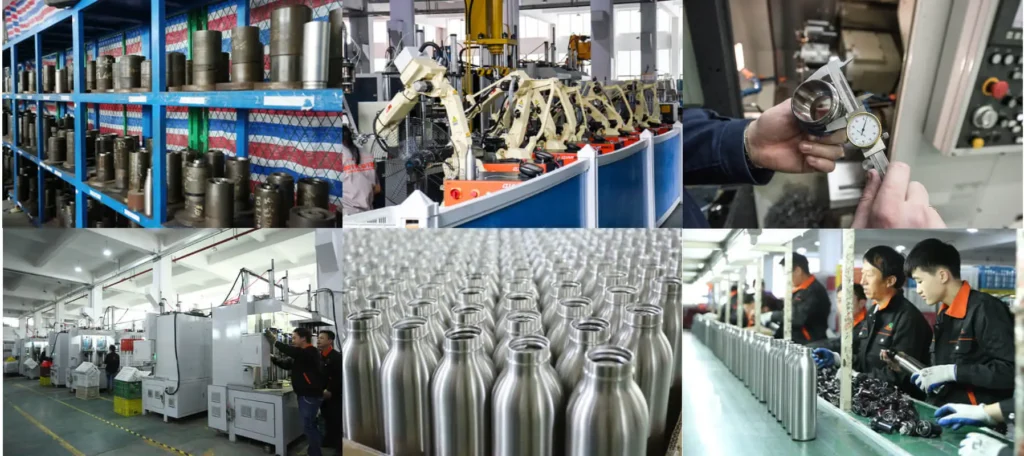
To understand the environmental impact of stainless steel water bottles, it's important to conduct a Life Cycle Assessment (LCA). LCA is a tool used to assess the environmental impacts associated with all stages of a product's life cycle, from raw material extraction to disposal.
By conducting an LCA, stainless steel water bottle manufacturers can identify areas where they can reduce their environmental impact and make more sustainable decisions throughout their production process.
Definition
Imagine being able to contribute to a sustainable future by using a stainless steel water bottle that's part of a circular economy. A circular economy aims to minimize waste and maximize resource use through sustainable production methods. This means products are designed with their entire lifecycle in mind, from production to disposal, and are kept in use for as long as possible.
To better understand what it means for stainless steel water bottle manufacturers to contribute to a circular economy, consider these four benefits:
- Reduced waste: By designing bottles that can be reused and recycled at the end of their lifecycle, manufacturers can help reduce waste in landfills.
- Lower environmental impact: Sustainable production methods can help reduce carbon emissions and other environmental impacts associated with manufacturing.
- Increased resource efficiency: When materials are kept in use for as long as possible, less raw materials need to be extracted from the earth.
- Economic opportunities: The circular economy presents new business models and opportunities for innovation, such as recycling programs and product redesigns.
Incorporating circular economy principles into the design and production of stainless steel water bottles not only benefits the environment but also creates economic opportunities for manufacturers while providing consumers with sustainable options.
Methodology
By implementing sustainable production methods and designing products with their entire lifecycle in mind, you can contribute to a circular economy.
To do this effectively, it's important to conduct data analysis to identify areas for improvement and set goals for reducing waste throughout the manufacturing process. This could include sourcing materials from suppliers who also prioritize sustainability or investing in energy-efficient machinery.
Implementation strategies may involve collaborating with other businesses in your industry or partnering with organizations that specialize in sustainability efforts.
It's also crucial to educate your employees about the importance of sustainable practices and provide training on how they can reduce waste in their daily routines.
By prioritizing sustainability and adopting circular economy principles, you can not only reduce your environmental impact but also create new economic opportunities by repurposing waste materials and creating closed-loop systems within your supply chain.
Applications
You can easily incorporate sustainable practices into your daily life by choosing reusable containers for your beverages and food, such as glass or silicone containers. However, one material that stands out in terms of durability and longevity is stainless steel.
Stainless steel water bottles are becoming increasingly popular among consumers who want to reduce their environmental impact while enjoying a stylish accessory. As a manufacturer, you have the opportunity to not only provide this product but also contribute to a circular economy through innovative designs and marketing strategies.
In terms of design, there are endless possibilities when it comes to stainless steel water bottles. You can play with shapes, colors, and sizes to create products that cater to different tastes and needs. For instance, you can offer personalized designs for sports enthusiasts or travelers who need lightweight yet sturdy options.
Additionally, you can experiment with patterns or textures that add a unique touch to your products. From tribal motifs to geometric shapes, there's no limit on how creative you can get. By doing so, you not only attract customers but also create an emotional connection between them and your brand - something that goes beyond functionality alone.
Certification and Standards

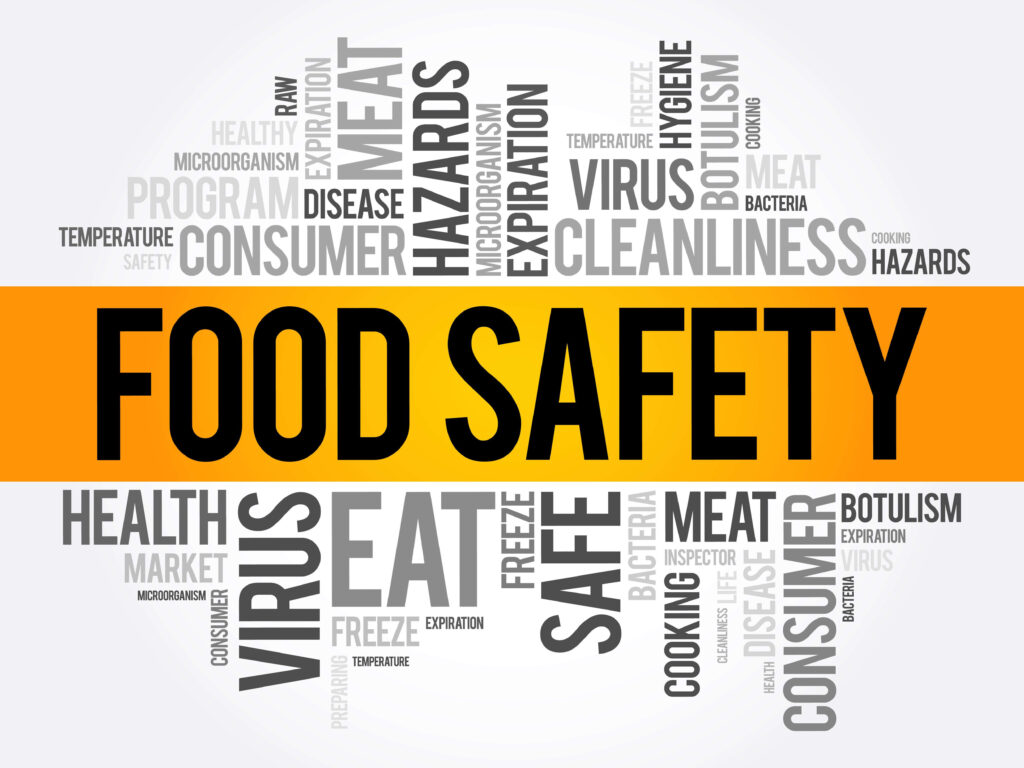
Don't overlook the importance of seeking out and adhering to certification and standards when producing stainless steel water bottles within a circular economy framework. Certification processes ensure that your products meet specific environmental and social criteria, which can give you a competitive edge in the market. Additionally, industry standards provide guidelines for best practices in manufacturing, which can help you streamline your production process while reducing waste.
When it comes to certifications, there are several options available for manufacturers of stainless steel water bottles. For example, Cradle to Cradle certification evaluates products based on their material health, recyclability, renewable energy use, carbon management, water stewardship, and social fairness. Another option is B Corporation certification which assesses companies based on their impact on workers, customers, suppliers, community and the environment. By obtaining these types of certifications or others like them, you demonstrate that your company is committed to creating a sustainable product.
In terms of industry standards for stainless steel water bottle manufacturing within a circular economy framework, there are many best practices available such as using recycled materials where possible or reducing the amount of raw materials used in production. Adhering to these standards not only helps reduce negative impacts on the environment but also improves efficiency by reducing costs associated with waste reduction efforts or disposal fees.
Ultimately, incorporating certification and industry standards into your production process will create positive impacts across multiple fronts including improving product quality while decreasing environmental harm.
Challenges and Opportunities
Now that you understand the importance of certification and standards in manufacturing stainless steel water bottles, it's time to focus on the challenges and opportunities that come with contributing to a circular economy.
As a manufacturer, you have the power to implement circular design principles into your product development process. This means designing products that can be easily disassembled and recycled at the end of their life cycle.
Implementing this type of design may seem daunting, but it presents an opportunity for innovation and differentiation in the market. By creating products that are not only functional but also sustainable, you can attract environmentally conscious consumers who prioritize eco-friendly options.
Additionally, sustainable sourcing is another opportunity for manufacturers to contribute to a circular economy by using materials that have been responsibly sourced and can be reused or recycled.
However, there are also challenges that come with implementing circular design principles and sustainable sourcing practices. These include finding suppliers who share your values, managing costs associated with responsible sourcing practices, and educating consumers on proper recycling methods.
Despite these challenges, it's important for manufacturers to prioritize sustainability in their operations as it not only benefits the environment but also strengthens brand reputation and creates long-term value for stakeholders.
Case Studies
Get inspired by these success stories of companies implementing sustainable design and sourcing practices in their manufacturing processes. Case study analysis shows that there are several industry best practices that stainless steel water bottle manufacturers can adopt to contribute to a circular economy.
One example is S'well, a company that produces reusable bottles made from stainless steel and other materials. S'well implements sustainable practices such as using eco-friendly packaging, partnering with organizations that promote clean water access, and working with factories that prioritize employee safety and fair wages. These efforts have helped S'well become a certified B Corporation and gain recognition as one of the most innovative sustainable companies in the world.
Another case study is Klean Kanteen, which has been producing stainless steel water bottles since 2004. The company uses only sustainable materials and partners with organizations that support environmental conservation efforts. Klean Kanteen also offers repair services for its products to extend their lifespan, reducing waste in landfills. These initiatives have helped position Klean Kanteen as a leader in the sustainable product space.
Hydro Flask is another example of a company committed to sustainability through its production process. The company uses recycled materials in its products and fosters environmentally responsible behavior among employees through education programs on sustainability issues. Hydro Flask's commitment to sustainability has resulted in it being awarded certifications such as Climate Neutral certification for taking action to reduce its carbon footprint.
By adopting these industry best practices, stainless steel water bottle manufacturers can not only contribute positively to the environment but also improve their brand reputation and increase customer loyalty among consumers who value sustainability.
Future Trends
As you look towards the future of stainless steel water bottle manufacturing, there are three key trends that will shape the industry:
- Innovation in materials will lead to new types of bottles with enhanced durability, insulation capabilities, and eco-friendliness.
- Digitalization and Industry 4.0 will revolutionize the supply chain by improving production efficiency, reducing waste, and increasing transparency.
- As consumers become more environmentally conscious, manufacturers must adapt to changing preferences by offering sustainable options that align with their values.
These trends highlight the importance of staying ahead of the curve in the industry. By embracing new materials, technologies, and consumer preferences, manufacturers can continue to innovate and meet the growing demand for sustainable products.
Innovation in Materials
With innovative materials, stainless steel water bottle manufacturers can help reduce waste and protect the environment for future generations. Sustainable solutions and eco-friendly alternatives are now available to replace traditional plastic bottles that pollute the planet.
For example, some manufacturers use recycled stainless steel to create their products, contributing to a circular economy where resources are used efficiently and waste is minimized.
In addition, new materials such as bioplastics made from renewable sources like cornstarch or sugarcane are being developed as an alternative to petroleum-based plastics. These materials can be composted at the end of their life cycle, reducing landfill waste and greenhouse gas emissions.
By incorporating these innovative materials into their production process, stainless steel water bottle manufacturers can enhance the sustainability of their product while also meeting consumer demand for environmentally friendly options.
Digitalization and Industry 4.0
Revolutionizing the production process, digitalization and Industry 4.0 have paved the way for unprecedented levels of automation and efficiency in manufacturing. Smart manufacturing has made it possible to integrate advanced technologies such as robotics, sensors, and artificial intelligence (AI) into the production line. With the help of these technologies, manufacturers can optimize their processes by detecting faults early on and making real-time adjustments.
Data analytics is another key component of digitalization in manufacturing. By leveraging data from sensors and other sources, manufacturers can gain insights into their operations that were previously impossible to obtain. This information can be used to improve product quality, reduce waste, and increase overall efficiency.
Predictive maintenance is also becoming increasingly popular in smart factories where machines are equipped with sensors that monitor their performance in real-time. This helps identify potential issues before they become major problems which could result in costly downtime or repairs.
By adopting these new technologies, manufacturers can create a more sustainable business model and contribute towards a circular economy by reducing waste while improving efficiency at the same time.
Consumer Behavior and Preferences
Consumers nowadays are increasingly conscious about the environmental impact of their purchases, leading them to seek out products that align with their values and beliefs. This shift in consumer behavior has resulted in a rise in demand for sustainable products, including stainless steel water bottles.
In fact, according to a study conducted by Grand View Research, the global reusable water bottle market is expected to reach $10.19 billion by 2025.
In response to this trend, stainless steel water bottle manufacturers can implement sustainability initiatives and marketing strategies that cater to environmentally-conscious consumers. These initiatives can include using recycled materials during production or implementing a take-back program for used bottles.
Marketing strategies can focus on promoting the durability and longevity of stainless steel water bottles as an alternative to single-use plastic bottles. By meeting the demands of conscious consumers and positioning themselves as eco-friendly brands, stainless steel water bottle manufacturers can contribute significantly towards building a circular economy while also increasing their revenue.
References
By utilizing recycled materials and implementing closed-loop production systems, stainless steel water bottle manufacturers can play a crucial role in promoting a circular economy.
Circular economy initiatives aim to reduce waste by keeping products and materials in use for as long as possible, through recycling, repurposing, or refurbishing. By using recycled materials to create their products and designing them with durability in mind, manufacturers can help extend the lifespan of their products and minimize waste.
In addition to sustainable manufacturing practices like using recycled materials, stainless steel water bottle manufacturers can also adopt closed-loop production systems. This means that they would collect used bottles from consumers, clean and sanitize them, then reuse the material to produce new bottles. By doing so, they can significantly reduce their environmental impact by minimizing resource consumption and reducing waste.
To further promote a circular economy in the manufacturing industry, stainless steel water bottle manufacturers could collaborate with other companies across different sectors to develop innovative solutions for reducing waste throughout the supply chain. They could also educate consumers about the benefits of reusable products like stainless steel water bottles and encourage them to participate in recycling programs.
Ultimately, by adopting sustainable practices and actively contributing to circular economy initiatives, stainless steel water bottle manufacturers can make a significant positive impact on the environment while still meeting consumer demand for high-quality products.
Glossary of Terms
Are you struggling to understand the technical terms used in sustainable manufacturing and circular economy initiatives? Here's a handy glossary of terms to help you navigate the conversation.
Circular economy benefits refer to the positive impacts that this economic model can bring. It involves reducing waste and pollution by designing products so that they can be reused, repaired, or recycled after their initial use is over. This approach also brings about cost savings as materials are kept in use for longer periods, reducing the need for new resource extraction.
When it comes to stainless steel water bottle manufacturers, sustainable manufacturing techniques are essential for contributing to a circular economy. Techniques such as using renewable energy sources like solar power or wind turbines during production reduce carbon emissions and minimize environmental impact. Additionally, designing products with recyclable materials ensures that end-of-life disposal is environmentally friendly and reduces waste generation.
By adopting these techniques, manufacturers can contribute positively towards a more sustainable future while also benefiting financially from reduced costs associated with inefficient practices.
Frequently Asked Questions
What are some common misconceptions about stainless steel water bottles and their impact on the environment?
You may have heard some misconceptions about stainless steel water bottles and their environmental impact. One common myth is that they can't be recycled, but the truth is that stainless steel is one of the most recyclable materials available. In fact, it can be recycled infinitely without losing its quality or purity.
Another misconception is that producing stainless steel water bottles requires a lot of energy and resources, leading to waste and pollution. However, compared to single-use plastic water bottles, the production process for stainless steel bottles uses far less energy and produces significantly less waste.
By choosing a reusable stainless steel water bottle instead of disposable plastic ones, you can help reduce waste and minimize your environmental impact in a meaningful way.
How do stainless steel water bottle manufacturers ensure their products are responsibly sourced and produced?
To ensure their products are responsibly sourced and produced, stainless steel water bottle manufacturers employ robust supply chain management practices. They work with suppliers who adhere to ethical labor standards and use environmentally friendly materials.
Additionally, they obtain environmental certifications such as ISO 14001 or the Forest Stewardship Council (FSC) to demonstrate their commitment to sustainability. These certifications require companies to follow strict guidelines for resource use, waste reduction, and pollution prevention.
By prioritizing responsible sourcing and production, stainless steel water bottle manufacturers can minimize their environmental impact while providing high-quality products that meet consumer demand for sustainable options.
What role do consumers play in promoting a circular economy for stainless steel water bottles?
As a consumer, you play a crucial role in promoting a circular economy for stainless steel water bottles. By educating yourself on the importance of recycling and properly disposing of your used bottles, you can help reduce waste and conserve resources.
Many stainless steel water bottle manufacturers also offer recycling programs for their products, allowing you to easily dispose of your used bottle in an environmentally-friendly manner. By participating in these programs and encouraging others to do the same, you can contribute to a more sustainable future while enjoying the benefits of using a durable and eco-friendly product.
How do stainless steel water bottle manufacturers address the issue of product disposal at the end of its life cycle?
When it comes to addressing the issue of product disposal at the end of their life cycle, stainless steel water bottle manufacturers have implemented recycling initiatives and material innovations. These initiatives aim to reduce waste and minimize environmental impact by encouraging customers to recycle their used bottles instead of throwing them away.
Material innovations involve developing new materials that are biodegradable or made from recycled materials. This not only reduces waste but also promotes a more sustainable manufacturing process.
With these efforts, stainless steel water bottle manufacturers are taking steps towards a circular economy where products are reused and recycled rather than discarded after use.
What steps are being taken to improve the sustainability of the manufacturing process for stainless steel water bottles?
To improve the sustainability of the manufacturing process for stainless steel water bottles, many manufacturers are incorporating sustainable practices and using eco-friendly materials.
This includes reducing energy and water usage during production, utilizing renewable energy sources, minimizing waste and emissions, and sourcing raw materials from responsible suppliers.
Some manufacturers also implement closed-loop systems that enable them to recycle their own scrap metal.
By adopting these practices, stainless steel water bottle manufacturers can reduce their environmental impact while still producing a high-quality product.
Conclusion
Congratulations! You've learned how stainless steel water bottle manufacturers can contribute to a circular economy. By understanding the environmental impact of plastic waste and choosing sustainable materials, designing for disassembly, and implementing extended producer responsibility programs, manufacturers can reduce their carbon footprint while creating value for their customers.
As consumers become more conscious about the impact of their purchases on the environment, businesses that prioritize sustainability will have a competitive advantage. By incorporating circular economy principles into their practices, stainless steel water bottle manufacturers can create products that are not only environmentally friendly but also durable and cost-effective.
In conclusion, it's essential for stainless steel water bottle manufacturers to take responsibility for the full lifecycle of their products by prioritizing sustainability at every stage of production. Through collaboration with stakeholders and innovative solutions, we can achieve a circular economy where resources are used efficiently and waste is minimized.
Let's work together towards a brighter future for our planet.

